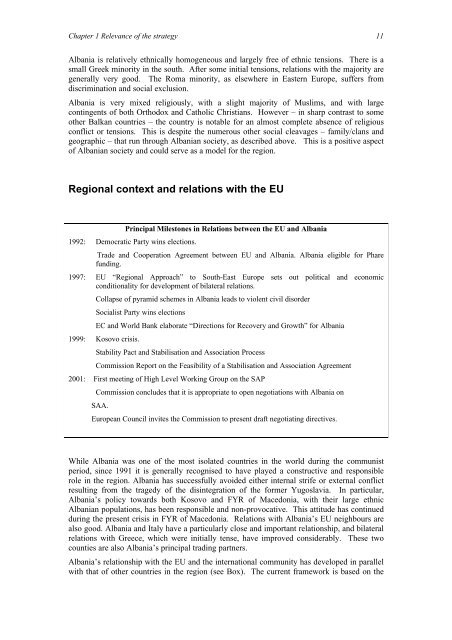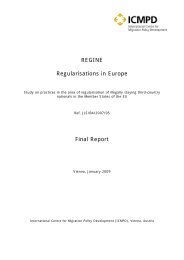Final Report - European Commission - Europa
Final Report - European Commission - Europa
Final Report - European Commission - Europa
Create successful ePaper yourself
Turn your PDF publications into a flip-book with our unique Google optimized e-Paper software.
Chapter 1 Relevance of the strategy 11<br />
Albania is relatively ethnically homogeneous and largely free of ethnic tensions. There is a<br />
small Greek minority in the south. After some initial tensions, relations with the majority are<br />
generally very good. The Roma minority, as elsewhere in Eastern Europe, suffers from<br />
discrimination and social exclusion.<br />
Albania is very mixed religiously, with a slight majority of Muslims, and with large<br />
contingents of both Orthodox and Catholic Christians. However – in sharp contrast to some<br />
other Balkan countries – the country is notable for an almost complete absence of religious<br />
conflict or tensions. This is despite the numerous other social cleavages – family/clans and<br />
geographic – that run through Albanian society, as described above. This is a positive aspect<br />
of Albanian society and could serve as a model for the region.<br />
Regional context and relations with the EU<br />
Principal Milestones in Relations between the EU and Albania<br />
1992: Democratic Party wins elections.<br />
Trade and Cooperation Agreement between EU and Albania. Albania eligible for Phare<br />
funding.<br />
1997: EU “Regional Approach” to South-East Europe sets out political and economic<br />
conditionality for development of bilateral relations.<br />
Collapse of pyramid schemes in Albania leads to violent civil disorder<br />
Socialist Party wins elections<br />
EC and World Bank elaborate “Directions for Recovery and Growth” for Albania<br />
1999: Kosovo crisis.<br />
Stability Pact and Stabilisation and Association Process<br />
<strong>Commission</strong> <strong>Report</strong> on the Feasibility of a Stabilisation and Association Agreement<br />
2001: First meeting of High Level Working Group on the SAP<br />
<strong>Commission</strong> concludes that it is appropriate to open negotiations with Albania on<br />
SAA.<br />
<strong>European</strong> Council invites the <strong>Commission</strong> to present draft negotiating directives.<br />
While Albania was one of the most isolated countries in the world during the communist<br />
period, since 1991 it is generally recognised to have played a constructive and responsible<br />
role in the region. Albania has successfully avoided either internal strife or external conflict<br />
resulting from the tragedy of the disintegration of the former Yugoslavia. In particular,<br />
Albania’s policy towards both Kosovo and FYR of Macedonia, with their large ethnic<br />
Albanian populations, has been responsible and non-provocative. This attitude has continued<br />
during the present crisis in FYR of Macedonia. Relations with Albania’s EU neighbours are<br />
also good. Albania and Italy have a particularly close and important relationship, and bilateral<br />
relations with Greece, which were initially tense, have improved considerably. These two<br />
counties are also Albania’s principal trading partners.<br />
Albania’s relationship with the EU and the international community has developed in parallel<br />
with that of other countries in the region (see Box). The current framework is based on the
















